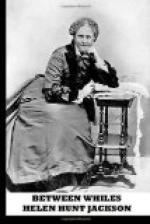Victorine glanced cautiously around her, and whispered: “It were ungrateful in me to say as much; but oh, sir, if thou didst but know how I wish myself back in the convent! I like not the ways of this place; and I fear so much the men who are often here. When thou didst speak at first I did think thou wert like them; but now I perceive that thou art quite different. Thou seemest to me like the men of whom Sister Clarice did tell me.” Victorine stopped, called up a blush to her cheeks, and said: “But I must not stay talking with thee. My aunt will be looking for me.”
“Stay,” said Willan. “What did the Sister Clarice tell thee of men? I thought not that nuns conversed on such matters.”
“Oh!” replied Victorine, innocently, “it was different with the Sister Clarice. She was a noble lady who had been betrothed, and her betrothed died; and it was because there were none left so noble and so good as he, she said, that she had taken the veil and would die in the convent. She did talk to me whole nights about this young lord whom she was to have wed, and she did think often that she saw his face look down through the roof of the cell.”
Clever Victorine! She had invented this tale on the spur of the instant. She could not have done better if she had plotted long to devise a method of flattering Willan Blaycke. It is strange how like inspiration are the impulses of artful women at times. It would seem wellnigh certain that they must be prompted by malicious fiends wishing to lure men on to destruction in the surest way.
Victorine had talked with Willan perhaps five minutes. In that space of time she had persuaded him of four things, all false,—that she was an innocent, guileless girl; that she had been seized with a sudden and reverential admiration for him; that she had no greater desire in life than to be back again in the safe shelter of the convent; and that her aunt Jeanne had never said an ill-word of him.
“Victorine! Victorine!” called a sharp loud voice,—the voice of Jeanne,—who would have bitten her tongue out rather than have broken in on this interview, if she had only known. “Victorine, where art thou loitering?”
“Oh, for heaven’s sake, sir, do not thou tell my grandfather that I have talked with thee!” cried Victorine, in feigned terror. “Here I am, aunt; I will be there in one second,” she cried aloud, and ran hastily down the storeroom. At the door she stopped, hesitated, turned back, and going towards the window said wistfully: “Thou hast never been here before all these three months. I suppose thou travellest this way very seldom.”
The full moon shone on Victorine’s face as she said this. Her expression was like that of a wistful little child. Willan Blaycke did not quite know what he was doing. He reached his hand across the window-sill towards Victorine; she did not extend hers. “I will come again sooner,” he said. “Wilt thou not shake hands?”




